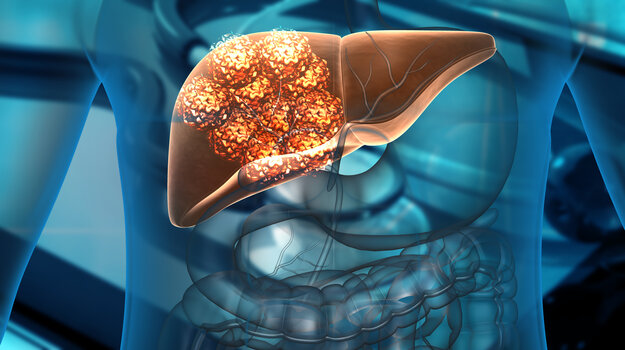
Pictured: Cancer cells growing on the liver/iStock, Rasi Bhadramani
The FDA on Monday approved Delcath Systems’ Hepzato Kit for the liver-directed treatment of adult patients with metastatic uveal melanoma, capping a nearly decade-long effort to secure regulatory approval.
Hepzato’s label covers metastatic uveal melanoma (mUM) patients with unresectable hepatic metastases that afflicts less than 50% of their liver and who do not show signs of extra-hepatic disease. Hepzato can also be used in cases of extra-hepatic spread, provided it is limited to the bone, lymph nodes, subcutaneous tissues or lungs.
Monday’s approval makes Hepzato “the only liver-directed therapy that can treat the whole liver,” Delcath Chief Medical Officer Vojislav Vukovic said in a statement.
The approved product comes with a boxed warning for severe peri-procedural complications, such as hemorrhage and hepatocellular injury, as well as myelosuppression. To manage these risks, the company will implement a Risk Evaluation and Mitigation Strategy program that will make Hepzato available only from qualified facilities.
Delcath is working to make the product available in the U.S. in the fourth quarter, for which it plans to partner with cancer centers across the country and establish a robust network of treatment sites qualified to administer Hepzato, CEO Gerard Michel said in a statement.
Hepzato is a drug-device combination of melphalan—a well-established chemotherapeutic agent—with the company’s Hepatic Delivery System, which can directly administer the drug to the liver. The drug-device combo allows higher doses of the medication to be delivered directly to the tumor’s region, while limiting systemic exposure and toxicity.
Delcath first sought FDA approval in August 2012. More than a year later, in September 2013, the regulator rejected the application, asking the company to perform another well-controlled randomized trial to better determine the safety and efficacy of the investigational product.
In February 2023, nearly 10 years later, Delcath resubmitted its New Drug Application. The NDA contained data from the Phase III FOCUS study, a single-arm, open-label trial which enrolled 91 patients who were treated every six to eight weeks for up to a maximum of six cycles.
FOCUS found that the drug-device combination had an overall response rate of 36.3%, including seven complete responders and 26 partial responders, with treatment response lasting for a median of 14 months. Patients treated with Hepzato saw a 73.6% disease control rate.
Given scientific evidence suggesting that Hepzato “may have broad applicability in other tumor types,” Delcath plans on expanding the product’s development beyond uveal melanoma, focusing on unresectable hepatic-dominant tumors with high incidence rates, Vukovic said.
Tristan Manalac is an independent science writer based in Metro Manila, Philippines. He can be reached at tristan@tristanmanalac.com or tristan.manalac@biospace.com.
- SEO Powered Content & PR Distribution. Get Amplified Today.
- PlatoData.Network Vertical Generative Ai. Empower Yourself. Access Here.
- PlatoAiStream. Web3 Intelligence. Knowledge Amplified. Access Here.
- PlatoESG. Automotive / EVs, Carbon, CleanTech, Energy, Environment, Solar, Waste Management. Access Here.
- PlatoHealth. Biotech and Clinical Trials Intelligence. Access Here.
- ChartPrime. Elevate your Trading Game with ChartPrime. Access Here.
- BlockOffsets. Modernizing Environmental Offset Ownership. Access Here.
- Source: https://www.biospace.com/article/delcath-gets-fda-approval-for-melanoma-drug-device-combo-10-years-after-rejection/?s=93



